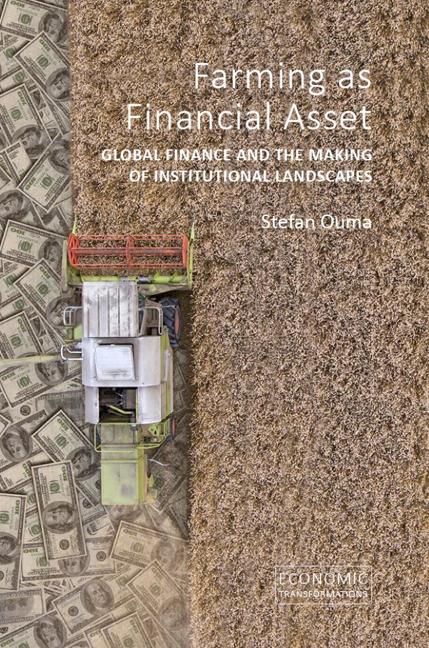Book contents
- Frontmatter
- Contents
- Preface
- Acknowledgements
- List of illustrations
- 1 Introduction
- 2 Optic: how do we study the finance– farming nexus?
- 3 History: how old is the finance– farming nexus?
- 4 Numbers: what we know (and do not know) about finance-gone-farming
- 5 States: how are foreign investments in farming regulated and accounted for?
- 6 Value(s): why has the road to “greener pastures” been so bumpy?
- 7 Delegation: what happens inside the agri-investment chain?
- 8 Grounding: what does assetization look like from below?
- 9 Radices: food futures, with or without finance as we know it?
- Epilogue
- References
- Index
1 - Introduction
- Frontmatter
- Contents
- Preface
- Acknowledgements
- List of illustrations
- 1 Introduction
- 2 Optic: how do we study the finance– farming nexus?
- 3 History: how old is the finance– farming nexus?
- 4 Numbers: what we know (and do not know) about finance-gone-farming
- 5 States: how are foreign investments in farming regulated and accounted for?
- 6 Value(s): why has the road to “greener pastures” been so bumpy?
- 7 Delegation: what happens inside the agri-investment chain?
- 8 Grounding: what does assetization look like from below?
- 9 Radices: food futures, with or without finance as we know it?
- Epilogue
- References
- Index
Summary
Finance has gone farming. Since the financial and food price crises of 2007/ 8, the world has seen a stark rise in financial investments in farmland and agricultural production by investment banks, sovereign wealth funds, pension funds, private equity funds, insurance companies, family offices, endowment funds and high-net-worth individuals (HNWIs). Indeed, finance has been identified as one of the main drivers of the so-called “global land rush” (Grain 2008; McMichael 2012; Fairbairn 2014; Ouma 2014), in which non-financial entities, such as state-run or parastatal companies or other types of corporate entities, also play a central role. As a result of declining or negative returns on mainstream assets in the wake of the global economic meltdown, a fear of rising levels of inflation caused by counter-cyclical interventions, money printing and quantitative easing in “core countries” such as the United States, low returns on savings and a rise in general distrust in complex financial products, investors searched for new “alternatives” within their “investment universe”. What was suddenly in demand was less “financial engineering” and more “real things”. Farming seemed a perfect match, with parts of the financial industry starting to make a strong case for the sector as an “alternative asset class” that was sustained by a set of strong market fundamentals. A growing world population (passing 7 billion people by the end of 2011); changing dietary preferences towards meat and protein in emerging markets such as China and Indonesia; a rising demand for agrofuels (and carbon sinks) in the light of peak oil and climate change; the limited availability of agricultural land (“peak soil”); and stagnant, or even decreasing, productivity levels in core production regions and climate-change-induced crop failures all seemed to make farming a safe financial bet. The financial industry quickly determined that these factors would shape future demand–supply dynamics along the agri-food chain in crucial ways.
In light of these dynamics, a standard narrative has evolved, which emphasizes that investments in agricultural operations and the underlying farmland should guarantee stable returns on capital invested.
- Type
- Chapter
- Information
- Farming as Financial AssetGlobal Finance and the Making of Institutional Landscapes, pp. 1 - 14Publisher: Agenda PublishingPrint publication year: 2020



